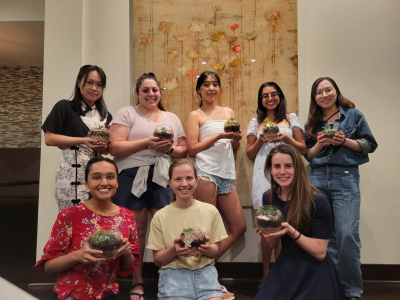Elizabeth Richardson, Trinity Communications

Economics has historically been a male-dominated field. Even now, only around 1/3 of economics Ph.D. students are women. While progress is being made, many young women are left to parse the heavily-patriarchal system on their own (interviews for faculty jobs in hotel rooms, anyone?).
Tirza Angerhofer, Ph.D., ‘28, is trying to change that. Through the Women in Economics group, she reached out to female faculty and female Ph.D. students in economics-related disciplines such as economics, public policy and business.
Her goal? To provide support for female Ph.D. students conducting economics research, encourage intergenerational knowledge transfer between faculty and students and provide information and support when there are instances of harassment.
“The group has facilitated conversations between female Ph.D. students across cohorts and also across programs, such as Economics, Fuqua School of Business and Sanford School of Public Policy ,” says Angerhofer.
She remembers how difficult the first year in doctoral programs can be, and knows many female students suffer from self-doubt. She wants students who are in upper years of their Ph.D.s to share their own experiences of fatigue and imposter syndrome, and also tell students that it gets better with time.
While the Women in Economics group has been around since 2020, Angerhofer revitalized it in Spring 2023, after a long hiatus.
“I hope that by re-starting this initiative, we can reduce social isolation and mental stress among the female Ph.D. students,” said Angerhofer.
The group plans two events every semester. First is a faculty-student lunch where faculty answer questions and give advice to female Ph.D. students. There’s also an end-of-semester social event just for Ph.D. students, to promote community across cohorts. This Fall, students bonded through a terrarium-building workshop.
In addition to those events, the group also fosters opportunities for connection with female faculty in Economics outside of Duke. By organizing breakfast events with visiting female faculty speakers, they allow group members to hear speakers share their experiences in academia, as well as everything from imposter syndrome, to conference and seminar behavior, to marriage and having children as an academic — a topic unfortunately still far more discussed among women than men.
“The main goal of the group is to promote community and encouragement among female Ph.D. students,” says Angerhofer. “We are very thankful for the generous support of the department of Economics that has provided funding for the group, and my hope is that these events make students more willing to share tough experiences and get the support they need from others.”